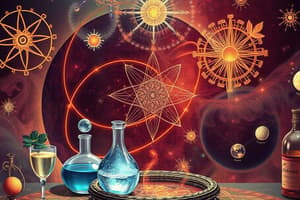Podcast
Questions and Answers
What are the building blocks of all matter, according to Dalton's atomic theory?
What are the building blocks of all matter, according to Dalton's atomic theory?
- Molecules
- Atoms (correct)
- Elements
- Chemical compounds
How do atoms of different elements differ, according to Dalton's atomic theory?
How do atoms of different elements differ, according to Dalton's atomic theory?
- In their chemical reactions
- In their size, mass, and other properties (correct)
- In their whole number ratios
- In their ability to combine
What can happen to atoms in chemical reactions, according to Dalton's atomic theory?
What can happen to atoms in chemical reactions, according to Dalton's atomic theory?
- They are always destroyed
- They are always subdivided
- They are combined, separated, or rearranged (correct)
- They are always created
What is one way in which Dalton's atomic theory has been modified?
What is one way in which Dalton's atomic theory has been modified?
What can be used to create or destroy atoms, according to modern science?
What can be used to create or destroy atoms, according to modern science?
Flashcards
Atoms (Dalton's Theory)
Atoms (Dalton's Theory)
The fundamental units of matter.
Element Variation (Dalton)
Element Variation (Dalton)
Differ in characteristics like size and mass.
Chemical Reaction Role (Atoms))
Chemical Reaction Role (Atoms))
Atoms can be combined, separated, or rearranged.
Atoms Can Be Subdivided
Atoms Can Be Subdivided
Signup and view all the flashcards
Creating/Destroying Atoms
Creating/Destroying Atoms
Signup and view all the flashcards
Study Notes
Dalton's Atomic Theory (1804)
- Dalton proposed a new theory of the atom based on his own experiments and observations, as well as the work of his peers.
Key Tenets of Dalton's Atomic Theory
- All matter is composed of extremely small particles called atoms.
- Atoms of a given element are identical in size, mass, and other properties.
- Atoms of different elements differ in size, mass, and other properties.
- Atoms cannot be subdivided, created, or destroyed (except for exceptions discovered later).
- Atoms of different elements can combine in simple whole number ratios to form chemical compounds.
- In chemical reactions, atoms are combined, separated, or rearranged.
Limitations of Dalton's Atomic Theory
- An atom can be further subdivided (contrary to Dalton's original theory).
- All atoms of an element are not identical in mass (contrary to Dalton's original theory).
- Using nuclear fission and fusion techniques, atoms can be created or destroyed by changing them into other atoms (contrary to Dalton's original theory).
Studying That Suits You
Use AI to generate personalized quizzes and flashcards to suit your learning preferences.



